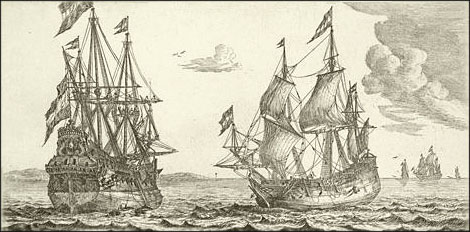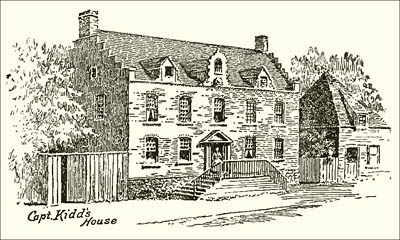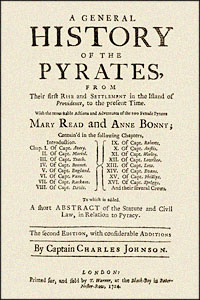unOFFICIAL JOSEPH SMITH HOME PAGE
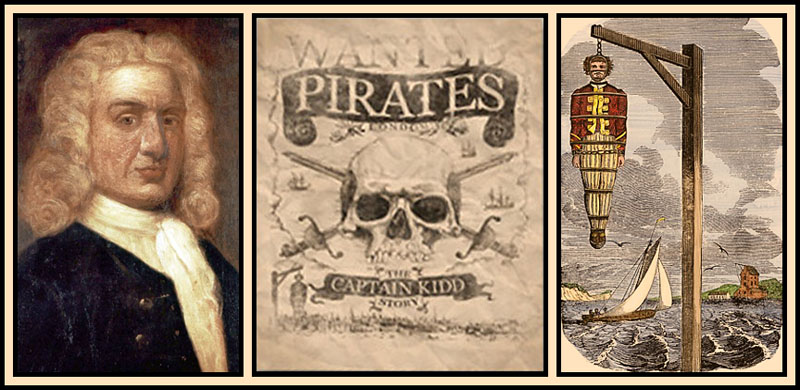
Capt. WILLIAM KIDD
Jos. Smith: (Pics & Photos) | (Money Digging) | (Young Joseph & Kidd) | Wm. Kidd: (Home)
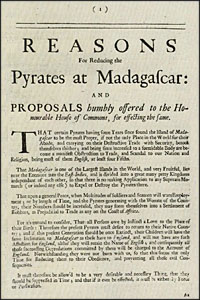 ( 1 ) R E A S O N S For Reducing the Pyrates at Madagascar: AND PROPOSALS humbly offered to the Honourable House of Commons, for effecting the same.
|
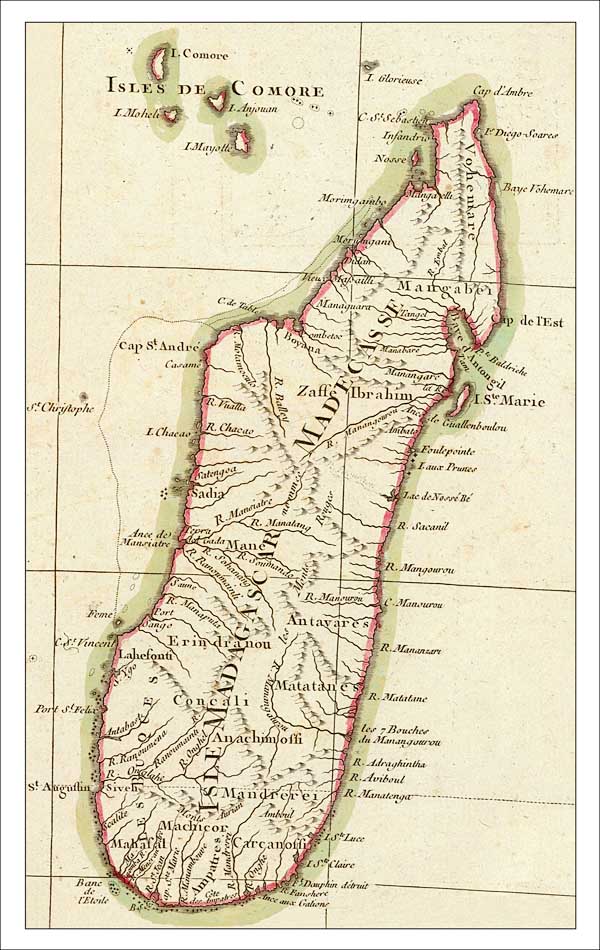
(click here for high resolution image of 1700s Madagascar map)
|
CAPTAINE ROBERT KIDD, WHO WAS HANGED IN CHAINS AT EXECUTION DOCK, FOR PIRACY AND MURDER ON Ye HIGH SEAS. ______ You captains brave and bold, hear our cries, hear our cries, You captains brave and bold, hear our cries, You captains brave and bold, tho' you seem uncontroll'd, Don't for the sake of gold lose your souls, lose your souls, Don't for the sake of gold lose your souls. My name was Robert Kidd, when I sail'd, when I sail'd, My name was Robert Kidd, when I sail'd. My name was Robert Kidd, God's laws I did forbid, And so wickedly I did, when I sail'd. My parents taught me well, when I sail'd, when I sail'd, My parents taught me well, when I sail'd. My parents taught me well to shun the gates of hell, But against them I rebell'd when I sail'd. I cursed my father dear, when I sail'd, when I sail'd, I cursed my father dear, when I sail'd. I cursed my father dear and her that did me bear, And so wickedly did swear, when I sail'd. I made a solemn vowl, when I sail'd, when I sail'd. I made a solemn vow, when I sail'd. I made a solemn vow, to God I would not bow, Nor myself one prayer allow, as I sail'd. I'd a bible in my hand when I sail'd, when I sail'd, I'd a bible in my hand, when I sail'd. I'd a Bible in my hand by my father's great command, And I sunk it in the sand, when I sail'd. 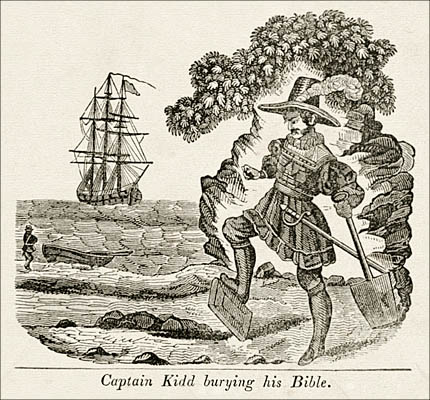
I murder'd William Moore, as I sail'd, as I sail'd, I murder'd William Moore, as I sail'd. I murder'd William Moore, and I left him in his gore, Not many a leagues from shore, as I sail'd. And being cruel still, as I sail'd, as I sail'd, And being cruel still, as I sail'd. And being cruel still, my gunner I did kill, And his precious blood did spill, as I sail'd. My mate took sick and died, as I sail'd, as I sail'd, My mate took sick and died, as I sail'd; My mate took sick and died, which me much terrified, When he call'd me to his bed-side, as I sail'd. And unto me did say, see me die, see me die, And unto me did ray, see me die; And unto me did say, take warning now, by me, There comes a reckoning day, you must die. You can not then withstand, when you die, when you die, You can not then withstand, when you die; You can not then withstand the judgments of God's hand, But bound then in iron bands, you must die. I was sick and nigh to death, as I sail'd, as I sail'd, I was sick and nigh to death, as I sail'd; I was sick and nigh to death, and I vow'd at every breath, To walk in wisdom's ways, as I sail'd. I thought I was undone, as I sail'd, as I sail'd, I thought I was undone, as I sail'd. I thought I was undone and my wicked glass had run, But my health did soon return as I sail'd. My repentance lasted not, as I sail'd, as I sail'd, My repentance lasted not, as I sail'd. My repentance lasted not, my vows I soon forgot, Damnation's my just lot, as I sail'd. I steer'd from sound to sound, as I sail'd, as I sail'd, I steer'd from sound to sound, as I sail'd. I steer'd from sound to sound, and many ships I found, And most of them I burn'd as I sail'd. I spy'd three ships from France, as I sail'd, as I sail'd, I spy'd three ships from France, as I sail'd. I spy'd three ships from France, to them I did advance, And I took them all by chance, as I sail'd. I spy'd three ships of Spain, as I sail'd, as I sail'd, I spy'd three ships of Spain, as I sail'd. I spy'd three ships of Spain, I fired on them amain, Till most of them were slain, as I sail'd. I'd ninety bars of gold, as I sail'd, as I sail'd, I'd ninety bars of gold, as I sail'd. I'd ninety bars of gold, and dollars manifold, With riches uncontroll'd, as I sailed. Then fourteen ships I see, as I sail'd, as I sail'd, Then fourteen ships I see, as I sail'd; Then fourteen ships I see and all brave they are, Ah! they were too much for me, as I sail'd. Thus being o'ertaken at last, I must die, I must die, Thus being o'ertaken at last, I must die; Thus being o'ertaken at last, and into prison cast, And sentence being pass'd, I must die. Farewell to the raging sea, I must die, I must die, Farewell to the raging main, I must die; Farewell to the raging main, to Turkey, France, and Spain, I ne'er shall see you again, I must die. 
To Newgate now I'm cast, and must die, and must die, To Newgate now I'm cast, and must die; To Newgate now I'm cast, with sad and heavy heart, To receive my just desert, I must die. To Execution Dock I must go, I must go, To Execution Dock, I must go; To Execution Dock, will many thousand flock, But I must bear my shock, I must die. Come all ye young and old, see me die, see me die, Come all ye young and old, see me die; Come all ye young and old, you're welcome to my gold, For by it I've lost my soul, and must die. Take warning now by me, for I must die, I must die, Take warning now by me, for I must die, Take warning now, by me, and shun bad company, Lest you come to hell with me, for I must die, Lest you come to hell with me, for I must die. |
|
Published by Authority. -- Printed by Edw. Jones, in the Savoy. Vol. I. London, United Kingdom, Thursday, May 22, 1701. No. 3708. London, May 23. This day Capt. William Kidd, and three other of the Pirates lately condemned at the Admiralty Sessions at Old-Baily, were executed at Execution-Dock. |
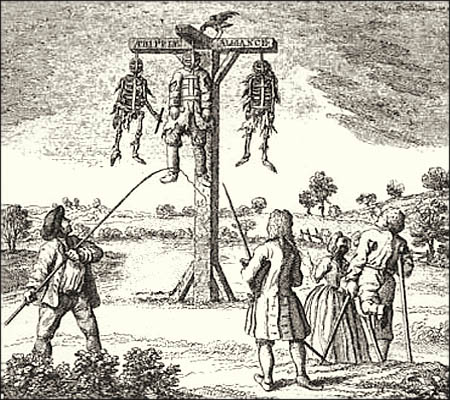
Criminals hung in chains - early 18th century. |
Vol. ? New York City, Wednesday, June 23, 1790. No. 465 For the New-York Daily Gazette. Mr. M'Lean: |
CONNECTICUT GAZETTE. Vol. XXVII. New London, Conn., Friday, July 2, 1790. No. 1390.
A letter from a gentleman in Southampton, Long Island, dated 28th ult., to the printers hereof, says, |
Vol. I. Brattleborough, Vermont, Monday, May 9, 1803. No. 12.
|
Vol. XV. Utica, New York, August, 5, 1817. No. 767.
FOR THE PATRIOT AND PATROL.
A tradition prevails on the Atlantic coast that the celebrated pirate, Capt. Kidd, buried his treasures on the shore, and consigned them to the care of evil spirits. If discovered they can be obtained only by magical ceremonies.... The treasure is discovered always by dreaming thrice that it may be found in the same place. |
Vol. ? Hallowell, Maine, Monday, March 18, 1822. No. ?
Money Diggers. -- In Pittston, about nine miles below Hallowell, on the eastern bank of Kennebec river, a party of about fourteen men are now engaged in digging for money. This extraordinary enterprise was commenced in 1817 and continued without much interruption for nearly a year, during which time a vast excavation was made, 75 feet deep. The enchanted treasure, however, we understand, completely eluded the search. It was afterwards partially abandoned, but in October last was recommenced with unabated vigor. The leader of this visionary gang is a substantial farmer, an inhabitant of a town not more than twelve miles distant from Hallowell, whose sons hold a reputable rank in society. The old man and his associates maintain an obstinate and mysterious silence upon the subject. As the scene of their labour is a resort for all the mischievous wags in the neighbourhood and of others who come to wonder at the infatuated perseverance of the money diggers, their taciturnity may partly be attributed to the unceasing ridicule which their visitants raise at their expense. |
Vol. ? New York City, Wednesday, April 24, 1822. No. ? COMMUNICATED TO THE EVENING POST. Kidd's money and the devil in the shape of black cat. -- A good deal of amusement was excited by the result of an application which was made to the police office last Saturday afternoon, for a posse of officers to go down to a house in Goldstreet, and explore the cause and object of certain mysterious proceedings which had been sometime going on in the cellar of the same. -- Men were heard digging there in the day time, with the door and windows closed, and lights burning within. The wicked souls would not tell their neighbors what they were doing, and their neighbors, like "poor aunt Charity Cockloft, who died of a Frenchman," were consuming with anxiety "to get at the bottom of it." -- Two resolute and intrepid police marshals were dispatched and soon explored their way down into the sepulchral region of doubt and mystery. Here was first seen a huge mass of new dug earth [losening] up almost to fill the cellar, and a deep broad oblong pit from which it had been evacuated. A closer inspection shewed a bible laid upon upon the margin of the pit with a naked sword laid across it -- In another quarter long shining rods of iron were displayed with bamboo cases for their safe preservation; and one might almost have imagined that he had found his way into the cell of an alchymist of the fourteenth century. The posse however pretty soon discovered a negro fellow glaring through a crevice in the door, and having made bon prize of him were directly in possession of the secret of the whole. He had been set to dig there by a white man whose name he did not disclose, and the object was buried money. The bible and sword were to keep the devil off -- the long shining iron rods were to explore ahead with; but what the use could be of the rods of different lengths, any more than the general singularity of the proceeding he did not explain. |
|
Vol. ? Boston, Massachusetts, Friday, June 7, 1822. No. ? CAPT. ROBERT KIDD. It is high time that this illustrious Sea Rover should be taken from the vile company, of the plundering, cold and cruel assassins (where for more than a century he has stood, in the vulgar opinion, with Black Beard and Coff and all others, a scape goat for all that was atrocious and bloody) and placed within the royal circle of associates, where his glories first vegetated. |
|
Vol. IX. Albany, New York, August ?, 1823. No. ? THE OLDEN TIME. Captain Kidd (so memorable in history) was a pirate during the reign of king William, has also found his way into our colonial records. According to Smollett, the colonies of North America had grown rich by piracy during the war with Spain. Kidd had offered to suppress these freebooters, provided government would furnish him with a ship of thirty guns; and the Admiralty being either unwilling or unable to afford him the proposed aid, a private subscription was set on foot by the Lord Chancellor, the Duke of Shrewsbury, the Earls of Romney, Oxford, and Bellamont, Sir Edward Harrison, and Colonel Livingston of New York. The king had promised to contribute one half of the expense, reserving to himself one tenth of the profits; but he never advanced the money. Kidd, thus equipped, set sail from Plymouth, and soon after turned pirate himself. -- He divided the booty which he had taken in the East Indies with his crew, burned his own ship, and sailed, in a prize which he had captured, to the West Indies. There he purchased a sloop, in which he steered for North America. -- Arriving on the coast of New-York, he sent one Emmet, to make his peace with Bellamont, the governor of the province, who inveigled him into negociation, and caused him to be arrested. Eventually he was taken to England, and there tried for piracy and murder in 1701, and executed. |
|
Vol. XXVI. New York City, Tuesday, September 9, 1823. No. ? Capt. Kidd. -- The name and exploits of this piratical hero, are familiar to every one, as the legends concerning him, we believe, are always carefully related to the tender inmates of every nursery in the country. A writer in the Albany Daily Advertiser, who has been amusing himself and the public for some months past, by gleaning curious facts from the ancient records of the state, in the Secretary's office, informs us that the name of Kidd has found its way into our Colonial records. Alter relating various facts concerning him, taken from these records, the writer asks -- "Would not the piratical deeds performed by Kidd -- the treasure he has buried, and the incantation he has performed in those midnight orgies, which were celebrated by him and his kindred spirits, form as good a foundation for an historical novel as any contained in the Waverley novels, so much sought after and admired?" -- We should certainly answer the question affirmatively. And we regret to add, that we have just been informed that the subject has already been seized upon by one who aspires to the rank of a novelist, without the talents to maintain it, and whose work is now in the press in this city. We allude to the author of "The Wilderness," a work exceedingly rich in incident, though so tame and clumsy in execution, as to weary and disappoint the reader. Our friend Cooper could give us a charming book about this famous sea-robber. |
|
Excerpt from Washington Irving's 1824 Tales of a Traveller (II:4 -- The Money-Diggers) [ 240 ] KIDD THE PIRATE. ________ KIDD THE PIRATE. 241 to the pirate; both fight for the love of plunder; only that the latter is the bravest, as he dares both the enemy and the gallows.But in whatever school they had been taught, the Buccaneers who kept about the English colonies were daring fellows, and made sad work in times of peace among the Spanish settlements and Spanish merchantmen. The easy access to the harbour of the Manhattoes; the number of hiding-places about its waters, and the laxity of its scarcely organized government, made it a great rendezvous of the pirates; where they might dispose of their booty, and concert new depredations. As they brought home with them wealthy lading of all kinds, the luxuries of the tropics, and the sumptuous spoils of the Spanish provinces, and disposed of them with the proverbial carelessness of freebooters, they were welcome visitors to the thrifty traders of the Manhattoes. Crews of these desperadoes, therefore, the runagates of every country and every clime, might be seen swaggering in open day about the streets of the 242 KIDD THE PIRATE. little burgh, elbowing its quiet mynheers; trafficking away their rich outlandish plunder at half or quarter price to the wary merchant, and then squandering their prize-money in taverns; drinking, gambling, singing, swearing, shouting, and astounding the neighbourhood with midnight brawl and ruffian revelry.At length these excesses rose to such a height as to become a scandal to the provinces, and to call loudly for the interposition of government. Measures were accordingly taken to put a stop to the widely-extended evil, and to ferret this vermin brood out of the colonies. Among the agents employed to execute this purpose was the notorious Captain Kidd. He had long been an equivocal character; one of those nondescript animals of the ocean that are neither fish, flesh, nor fowl. He was somewhat of a trader, something more of a smuggler, with a considerable dash of the pickaroon. He had traded for many years among the pirates, in a little rakish, musquito-built vessel, that could run into all kinds of waters. He KIDD THE PIRATE. 243 knew all their haunts and lurking-places; was always hooking about on mysterious voyages; and as busy as a Mother Cary's chicken in a storm.This nondescript personage was pitched upon by government as the very man to hunt the pirates by sea, upon the good old maxim of "setting a rogue to catch a rogue;" or as otters are sometimes used to catch their cousins-german, the fish. Kidd accordingly sailed for New York, in 1695, in a gallant vessel called the Adventure Galley, well armed and duly commissioned. On arriving at his old haunts, however, he shipped his crew on new terms; enlisted a number of his old comrades, lads of the knife and the pistol, and then set sail for the East. Instead of cruising against pirates, he turned pirate himself; steered to the Madeiras, to Bonavista, and Madagascar, and cruised about the entrance of the Red Sea. Here, among other maritime robberies, he captured a rich Quedah merchantman, manned by Moors, though commanded by 244 KIDD THE PIRATE. an Englishman. Kidd would fain have passed this off for a worthy exploit, as being a kind of crusade against the infidels; but government had long since lost all relish for such Christian triumphs.After roaming the seas, trafficking his prizes, and changing from ship to ship, Kidd had the hardihood to return to Boston, laden with booty, with a crew of swaggering companions at his heels. Times, however, had changed. The buccaneers could no longer show a whisker in the colonies with impunity. The new governor, Lord Bellamont, had signalized himself by his zeal in extirpating these offenders; and was doubly exasperated against Kidd, having been instrumental in appointing him to the trust which he had betrayed. No sooner, therefore, did he show himself in Boston, than the alarm was given of his re-appearance, and measures were taken to arrest this cut-purse of the ocean. The daring character which Kidd had acquired, however, and the desperate fellows KIDD THE PIRATE. 245 who followed like bull-dogs at his heels, caused a little delay in his arrest. He took advantage of this, it is said, to bury the greater part of his treasures, and then carried a high head about the streets of Boston. He even attempted to defend himself when, arrested, but was secured and thrown into prison, with his followers. Such was the formidable character of this pirate and his crew, that it was thought advisable to despatch a frigate to bring them to England. Great exertions were made to screen him from justice, but in vain; he and his comrades were tried, condemned, and hanged at Execution Dock, in London. Kidd died hard, for the rope with which he was first tied up broke with his weight, and he tumbled to the ground. He was tied up a second time, and more effectually; from hence came, doubtless, the story of Kidd's having a charmed life, and that he had to be twice hanged.Such is the main outline of Kidd's history; but it has given birth to an innumerable progeny of traditions. The report of his having 246 KIDD THE PIRATE. buried great treasures of gold and jewels before his arrest set the brains of all the good people along the coast in a ferment. There were rumours on rumours of great sums of money found here and there, sometimes in one part of the country, sometimes in another; of coins with Moorish inscriptions, doubtless the spoils of his eastern prizes, but which the common people looked upon with superstitious awe, regarding the Moorish letters as diabolical or magical characters.Some reported the treasure to have been buried in solitary, unsettled places about Plymouth and Cape Cod; but by degrees various other parts, not only on the eastern coast, but along the shores of the Sound, and even of Manhattan and Long Island, were gilded by these rumours. In fact, the rigorous measures of Lord Bellamont had spread sudden consternation among the buccaneers in every part of the provinces: they had secreted their money and jewels in lonely out-of-the-way places, about the wild shores of the rivers and sea-coast, and dispersed KIDD THE PIRATE. 247 themselves over the face of the country. The hand of justice prevented many of them from ever returning to regain their buried treasures, which remained, and remain probably to this day, objects of enterprise for the money-digger.This is the cause of those frequent reports of trees and rocks bearing mysterious marks, supposed to indicate the spots where treasure lay hidden; and many have been the ransackings after the pirates' booty. In all the stories which once abounded of these enterprises, the devil played a conspicuous part. Either he was conciliated by ceremonies and invocations, or some solemn compact was made with him. Still he was ever prone to play the money-diggers some slippery trick. Some would dig so far as to come to an iron chest, when some baffling circumstance was sure to take place. Either the earth would fall in and fill up the pit, or some direful noise or apparition would frighten the party from the place; and sometimes the devil himself would appear, and bear off" the prize when within their very grasp; and if they revisited 248 KIDD THE PIRATE. the place the next day, not a trace would be found of their labours of the preceding night.All these rumours, however, were extremely vague, and for a long time tantalized without gratifying my curiosity. There is nothing in this world so hard to get at as truth, and there is nothing in this world but truth that I care for. I sought among all my favourite sources of authentic information, the oldest inhabitants, and particularly the old Dutch wives of the province; but though I flatter myself that I am better versed than most men in the curious history of my native province, yet for a long time my inquiries were unattended with any substantial result. At length it happened that, one calm day in the latter part of summer, I was relaxing myself from the toils of severe study, by a day's amusement in fishing in those waters which had been the favourite resort of my boyhood. I was in company with several worthy burghers of my native city, among whom were more than one illustrious member of the corporation, whose KIDD THE PIRATE. 249 names, did I dare to mention them, would do honour to my humble page. Our sport was indifferent. The fish did not bite freely, and we frequently changed our fishing-ground without bettering our luck. We were at length anchored close under a ledge of rocky coast, on the eastern side of the Island of Manhatta. It was a still, warm day. The stream whirled and dimpled by us, without a wave or even a ripple; and every thing was so calm and quiet, that it was almost startling when the kingfisher would pitch himself from the branch of some dry tree, and after suspending himself for a moment in the air to take his aim, would souse into the smooth water after his prey. While we were lolling in our boat, half drowsy with the warm stillness of the day and the dulness of our sport, one of our party, a worthy alderman, was overtaken by a slumber, and as he dosed, suffered the sinker of his drop-line to lie upon the bottom of the river. On waking, he found he had caught something of importance, from the weight. On drawing it to the surface,250 KIDD THE PIRATE. we were much surprised to find it a long pistol of very curious and outlandish fashion, which, from its rusted condition, and its stock being worm-eaten and covered with barnacles, appeared to have lain a long time under water. The unexpected appearance of this document of warfare occasioned much speculation among my pacific companions. One supposed it to have fallen there during the revolutionary war; another, from the peculiarity of its fashion, attributed it to the voyagers in the earliest days of the settlement; perchance to the renowned Adrian Block, who explored the Sound, and discovered Block Island, since so noted for its cheefee. But a third, after regarding it for some time, pronounced it to be of veritable Spanish workmanship."I'll warrant," said he, "if this pistol could talk, it would tell strange stories of hard fights among the Spanish Dons. I've no doubt but it is a relique of the buccaneers of old times -- who knows but it belonged to Kidd himself?" "Ah! that Kidd was a resolute fellow," KIDD THE PIRATE. 251 cried an old iron-faced Cape Cod whaler. -- "There's a fine old song about him, all to the tune of --As I sailed, as I sailed -- As I sailed, as I sailed, And I buried it in the sand As I sailed. -- |
|
New-York [ ] American. Vol. VI. New York City, July, 1825. No. ? All the money-diggers, and believers in Captain Kidd's hidden treasures, in the upper part of the city, were set in motion on Friday evening, ny a report that a vast treasure in gold had been found by some laborers digging the foundation of a house in the vicinity of Chatham Square. |
|
Vol. ? New York City, December 2 ?, 1826. No. ? Money Hunting. -- Nearly every scheme for recovering buried or sunken treasures, from the inhumed coffers of Captain Kidd, to the submerged fortunes of the frigate Hussar at Hell Gate, appear to be attended with some unlucky contingency, which snatched the almost-possessed hoards from mortal hands. The genii of Kidd, and the demon of the Gate, have been exercised and combatted, but all to no purpose, they prove invincible sentiments of their ghostly employers. |
|
CONNETICUT MIRROR. Vol. XIX. Hartford, Conn., Monday, July 16, 1827. No. 5. FOR THE MIRROR. _____ THE MONEY DIGGERS. *
|
|
AND ALBANY SATURDAY MAGAZINE. Vol. I. Albany, New York, Saturday, October 6, 1827. No. ? THE BUCCANEERS. The new Romanic under the title of "The Buccaneers," A Romance of our own country in its ancient day, which was announced some weeks past as in press, will it is understood, make its appearance in about a week in the city of New-York, and will be published in London during the middle of this month, October. The scene of its action lies principally on the Island of Manhattan, or Newfork, though partly at the city of Albany, and its immediate neighbourhood, during the latter end of the 17th century, and at an interesting period of the colonial history, as the work portrays the fierce struggle for supremacy between the factions of the Bayard and Leister families (the provincial houses of York and Lancaster) whose terrible controversies for power, as represented by Smith in his excellent history of New-York, convulsed the province almost to its ruin, giving advantage of annoyance to foreign and intestine enemies, as was proved by the successful inroads in the colony by the French from Canada, and the burning and massacre at Schenectady by the Indians. The celebrated freebooter Capt Kidd is also an important personage in the Romance, and although the fame of this daring robber who was once the terror of the ocean, will most probably be handed down to an hundred succeeding generations, by the old ballad "As I sailed, &c." and the numerous fireside traditions, the coinage of fear and superstition with which our country abounds; there are few but will be gratified at the perusal of a work which describes among its character a rover so savage and relentless: indeed the name of Kidd is in part intimately interwoven with our Colonial Records. He was a pirate during the reign of King William the Third; for according to Smollett, the colonies of North America having grown rich by piracy, Kidd was despatched with a vessel fitted out for the purpose to suppress the maruaders, but he turned pirate himself, and during his career had a notion and fully justified all the anticipations of secret place of retirement on or near a hill about two miles south of the city of Albany, (and which still bears the name of Kiddenhoogten, as it is improperly called Kettenhoogten,) that hill according to tradition he adopted as a place of rendezvous, for those infernal spirits, to whose care he entrusted the enormous sums of money which he buried in the earth, ami there it is said also, he made a cave which is hidden from all human observation in which he buried 50 boxes of gold, and laid upon them 13 human bodies of those whom he had murdered, in order to serve as a talisman against the prying curiosity of such as were in search of hidden treasure. At Coeymans also, it is affirmed, that Kidd remained during part of two seasons, secreted in a barn belonging to one of the name of Coeyman's, and afterwards in a mill called Livingston's mill, the property of Col. Livingston, and ancestor of the present family of that name, who by many was supposed (possibly without foundation) to have protected and encouraged the dangerous marauder. Eventually, Kidd was taken and sent to England, and there tried for murder and piracy, and executed in 1701. Besides an interesting story which the stirring events of the period so easily admits, it is presumed that the Romance of "The Buccaneers" will afford considerable entertainment from a humorous though faithful portraiture of the manners, customs and fashions of the honest Dutch settlers of the New Netherlands, as many of the "Mynheers and frawes," the progenitors of many of our citizens whose names are familiar from their extraction, and as connected from the first settlement with New-York, are said to figure in the pages of this forthcoming work -- and doubtless the simple manners of the olden day have given opportunitiess for many ludicrous though just comparisons with the fashions, luxuries, and follies of our own times. |
 Vol. ? New York City, Friday, January 25, 1867. No. ? Captain Kidd and his Treasure. Every year or two we hear of some new attempt to discover the hidden treasure of Captain Kidd. Now it is in Nova Scotia, now at Lynn, Mass., then at Coventry, Conn., and often at points near New Haven harbor. And yet very few know the story of Captain Kidd's wanderings. We present below an authentic sketch which is almost as good as romance: |
return to the top of this page
The Joseph Smith Home Page
